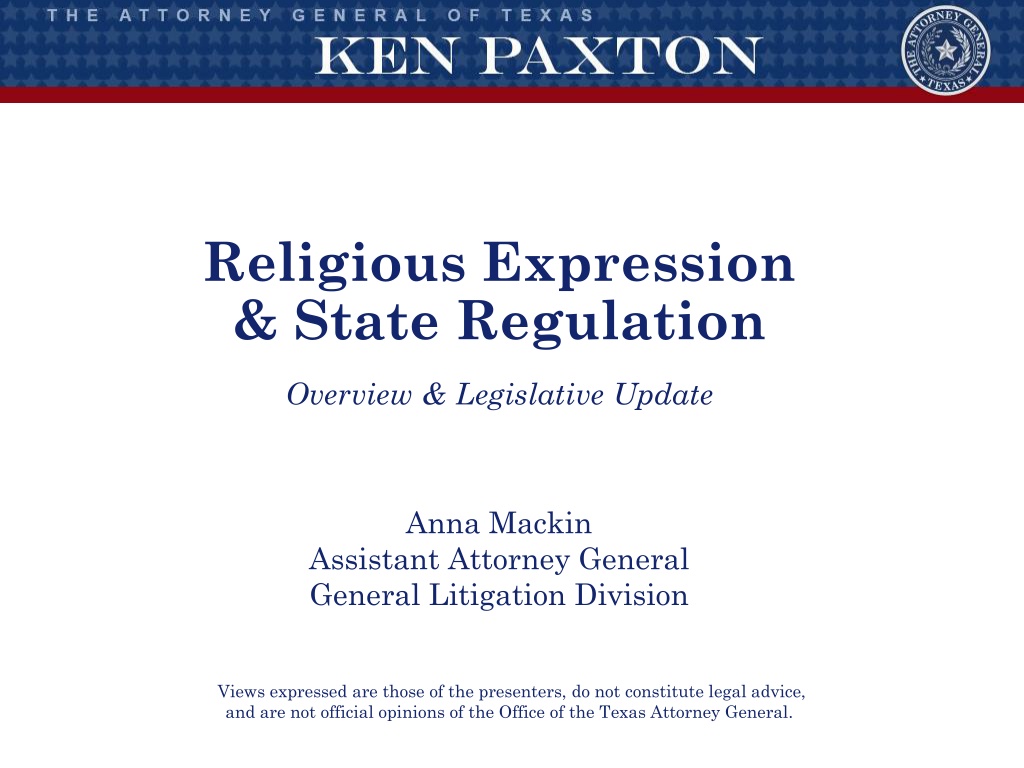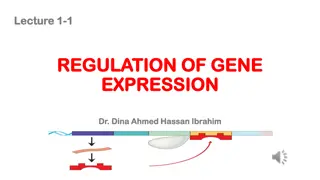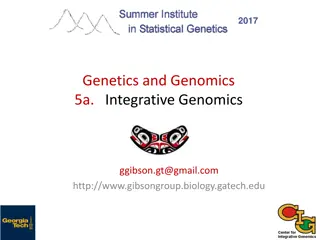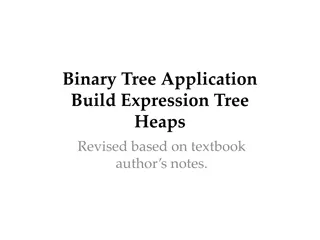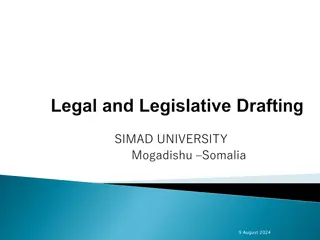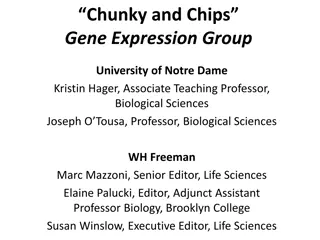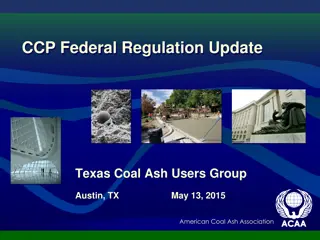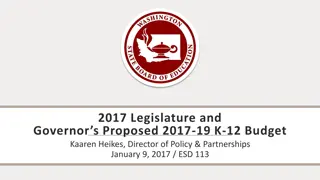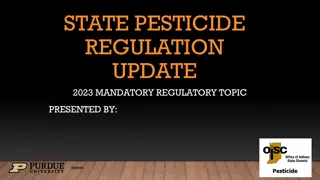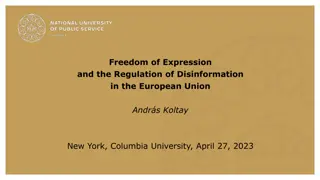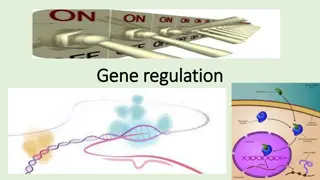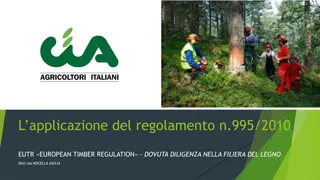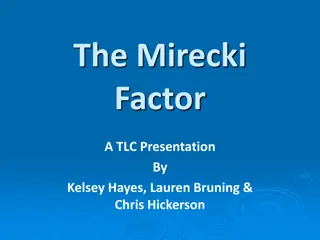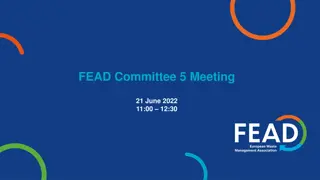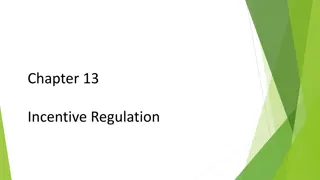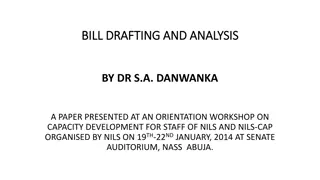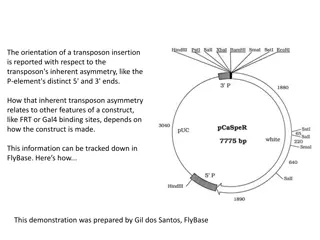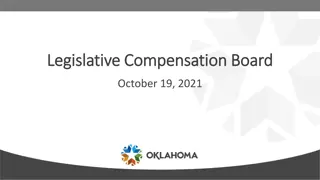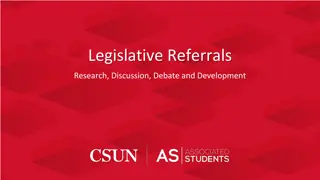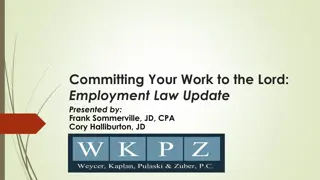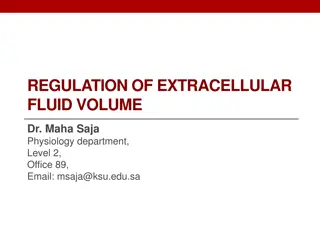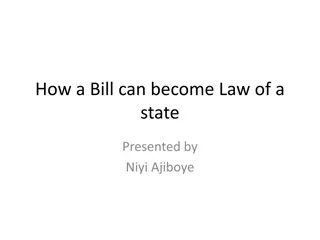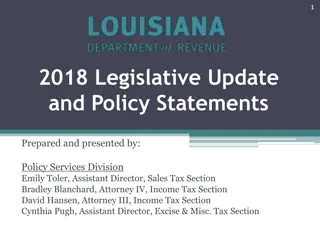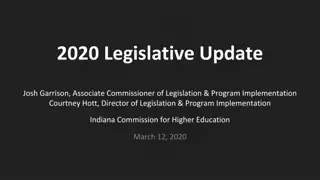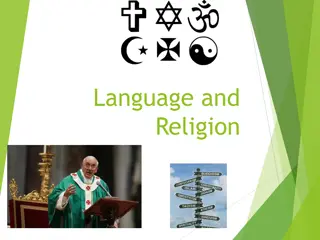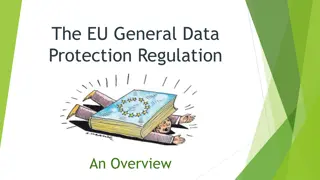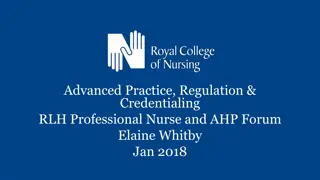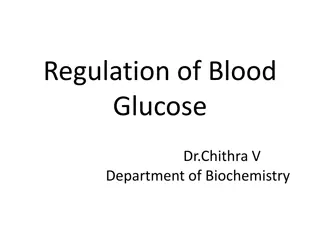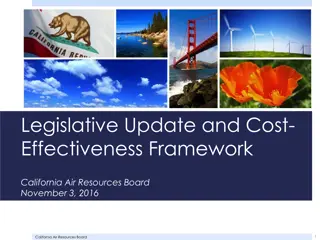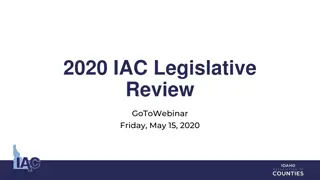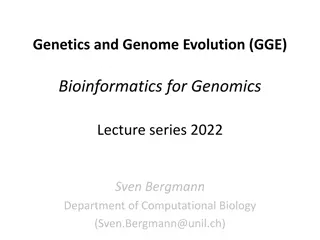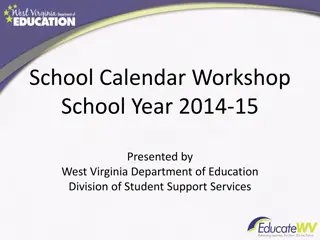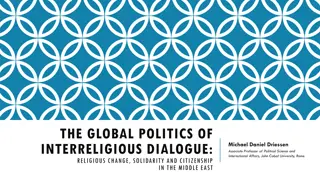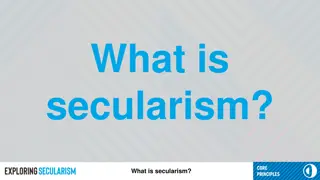Religious Expression & State Regulation Overview: Legislative Update
The content delves into the Establishment Clause, focusing on the Lemon test and historical guidance to address government action concerning religion. It also explores the tradition of prayer in public bodies and the constitutional considerations surrounding it, emphasizing inclusivity and tolerance for differing views.
Download Presentation

Please find below an Image/Link to download the presentation.
The content on the website is provided AS IS for your information and personal use only. It may not be sold, licensed, or shared on other websites without obtaining consent from the author. Download presentation by click this link. If you encounter any issues during the download, it is possible that the publisher has removed the file from their server.
E N D
Presentation Transcript
Religious Expression & State Regulation Overview & Legislative Update Anna Mackin Assistant Attorney General General Litigation Division Views expressed are those of the presenters, do not constitute legal advice, and are not official opinions of the Office of the Texas Attorney General.
The Genesis establishment of religion, or prohibiting the free exercise thereof; or abridging the freedom of speech, or of the press; or the right of the people peaceably to assemble, and to petition the Government for a redress of grievances. Congress shall make no law respecting an U.S. CONST. amend. I
Establishment Clause Under the (old) Lemon test, government action violates the Establishment Clause if it: Does not have a predominantly secular purpose Has the purpose or effect of advancing or inhibiting religion, or Fosters excessive government entanglement with religion Lemon v. Kurtzman, 403 U.S. 602, 612-13 (1971)
Establishment Clause to find a grand unified theory of the Establishment Clause, in later cases, we have taken a more modest approachthat focuses on the particular issueat hand and looks to history for guidance. While the Lemon Court ambitiously attempted American Legion v. American Humanist Association, 139 S. Ct. 2067, 2087 (2019)
Prayer The opening of sessions of legislative and other deliberative public bodies with prayer is deeply embedded in the history and tradition of this country. being exploited to proselytize or advance any one, or to disparage any other, faith or belief. The Establishment Clause prohibits such prayer Marsh v. Chambers, 463 U.S. 783, 785, 786 (1983)
Prayer The Court s inquiry, then, must be to determine whether the prayer practice . . . fits within the tradition long followed in Congress and the state legislatures. Town of Greece, N.Y. v. Galloway, 572 U.S. 565, 573 (2014) example of respect and tolerance for differing views, an honest endeavor to achieve inclusivity and nondiscrimination, and a recognition of the important role that religion plays in the lives of many Americans. Where categories of monuments, symbols, and practices with a longstanding history follow in that tradition, they are likewise constitutional. The practice begun by the First Congress stands out as an Am. Legion v. Am. Humanist Ass n, 139 S. Ct. at 2089
Displays Legal analysis depends on whether a display is government or private expression
Is a Display Government Speech? Factors Historically used to communicate with public Likely identified with government Degree of government control Standard Must satisfy Establishment Clause Free Speech Clause does not apply (but use caution)
Is a Display Government Speech? Examples of Government Speech 15 donated monuments in public park, Pleasant Grove City v. Summum, 555 U.S. 460 (2009) State license plates, Walker v. Texas Div., Sons of Confederate Veterans, 135 S. Ct. 2239 (2015) Ads by statutorily established beef-promotion board, Johanns v. Livestock Mktg. Ass n, 544 U.S. 550 (2005)
Is a Display Government Speech? regulate speech in ways that favor some viewpoints or ideas at the expense of others, but imposing a requirement of viewpoint-neutrality on government speech would be paralyzing. When a government entity embarks on a course of action, it necessarily takes a particular viewpoint and rejects others. The Free Speech Clause does not require government to maintain viewpoint neutrality when its officers and employees speak about that venture. The First Amendment forbids the government to Matal v. Tam, 137 S. Ct. 1744, 1757 (2017)
Displays: Forum Analysis First Amendment protects private speech on government property based on type of forum Traditional Public Forum: Property that the public since time immemorial has used for assembly and general communication Designated Public Forum: Government property that is not a traditional public forum but is intentionally opened up for that purpose Limited Forum: Government has reserved a forum for certain groups or discussion of certain topics Nonpublic Forum: Government acts as a proprietor, managing its internal operations
Displays: Forum Analysis In a traditional public forum or a designated public forum: [r]easonable time, place, and manner restrictions are allowed, but any restriction based on the content of the speech must satisfy strict scrutiny . . . the restriction must be narrowly tailored to serve a compelling government interest, and restrictions based on viewpoint are prohibited. Pleasant Grove City v. Summum, 555 U.S. 467, 468 (2009)
Displays: Forum Analysis In a limited forum or a nonpublic forum that are reasonable and viewpoint neutral. a government entity may impose restrictions on speech Summum, 555 U.S. at 470
Free Exercise Clause against unequal treatment and subjects to the strictest scrutiny laws that target the religious for special disabilities based on their religious status. . . . Denying a generally available benefit solely on account of religious identity imposes a penalty on the free exercise of religion that can be justified only by a state interest of the highest order. The Free Exercise Clause protects religious observers Trinity Lutheran Church of Columbia, Inc. v. Comer, 137 S. Ct. 2012, 2019 (2017) (citations omitted)
SB 1978 may not take any adverse action against any person based wholly or partly on the person s membership in, affiliation with, or contribution, donation, or other support provided to a religious organization. Notwithstanding any other law, a governmental entity TEX. GOV T CODE 2400.002
SB 1978 Adverse action means any action taken by a governmental entity to: (A) withhold, reduce, exclude, terminate, or otherwise deny any grant, contract, subcontract, cooperative agreement, loan, scholarship, license, registration, accreditation, employment, or other similar status from or to a person; (B) withhold, reduce, exclude, terminate, or otherwise deny any benefit provided under a benefit program from or to a person; (C) alter in any way the tax treatment of, cause any tax, penalty, or payment assessment against, or deny, delay, or revoke a tax exemption of a person; (D) disallow a tax deduction for any charitable contribution . . . (E) deny admission to, equal treatment in, or eligibility for a degree from an educational program or institution to a person; or (F) withhold, reduce, exclude, terminate, or otherwise deny access to a property, educational institution, speech forum, or charitable fund- raising campaign from or to a person. TEX. GOV T CODE 2400.001(1)
Managing Risk Establish effective policy Written Publicly available Specific (avoids unbridled discretion) Apply policy to manage requests Educate everyone in decisional chain Ensure uniformity in application If uncertain, seek help first
Religious Expression & State Regulation Overview & Legislative Update Anna Mackin Assistant Attorney General General Litigation Division Views expressed are those of the presenters, do not constitute legal advice, and are not official opinions of the Office of the Texas Attorney General.
